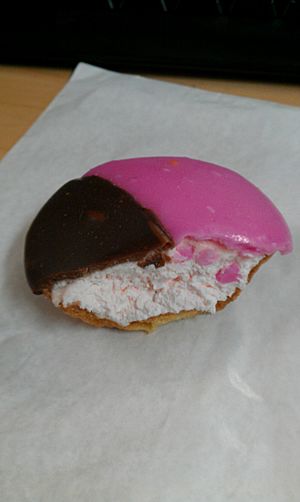Neenish tart facts for kids

A neenish tart with a bite taken out of it
|
|
| Alternative names | Nienich, nenische |
|---|---|
| Type | Tart |
| Place of origin | Australia |
| Main ingredients | Pastry base, sweet gelatine-set cream, butter cream, or icing sugar |
A neenish tart is a yummy dessert that looks like a small pie. It has a pastry base, which is like a crust. Inside, it's filled with a sweet mix. This can be creamy, or made with lemon and condensed milk.
On top, there's usually a special icing with two different colors. These colors are often brown, white, or pink. Neenish tarts are almost always small, perfect for one person. They are about 60 to 80 millimeters wide. This tasty treat first came from Australia. You can mostly find them there, and also in New Zealand and the Falkland Islands.
Contents
What's in a Neenish Tart?
A neenish tart starts with a crisp pastry shell. The filling can be different things. Some tarts have a sweet, creamy filling that uses gelatine to make it firm. Other fillings might be a mock cream or a sweet paste made from icing sugar.
Sometimes, a layer of raspberry jam is added under the filling. This gives the tart an extra fruity taste. The two-colored icing on top is a classic part of the neenish tart. It makes them easy to spot!
Where Did the Name Come From?
No one is completely sure how the name "neenish" came about. Some people once thought it was named after a woman called Ruby Neenish. However, this turned out to be a joke!
Other old names for the tart were nenische or nienich. These names sound a bit German. But the name "neenish" was used even earlier. So, it seems the other names might have just been used to make the tart sound more fancy or "European."
Early Recipes and History
Neenish tarts have been around for a long time! Cakes similar to them appeared in Sydney newspapers as early as 1895. The very first recipe for a "neenish tart" was printed in the Sydney Mail newspaper in November 1901.
Another similar recipe was published in Tasmania in 1903. Both of these early recipes used an almond pastry. Their filling was a thick custard made with eggs and milk. The icing on top was split into two halves: one coffee-flavored and one vanilla.
Over time, the recipes changed. A 1929 cookbook called for a cream filling set with gelatine. It also suggested pink and white icing. By 1932, another recipe used a custard filling with chocolate and white icing.
Neenish Tarts in New Zealand
In New Zealand, the most common neenish tart has a lemon flavor. This popular version is found in the famous Edmonds Cookery Book.
This recipe uses a sweet short pastry crust. The filling is made from butter, icing sugar, sweetened condensed milk, and lemon juice. The top is usually half plain white icing and half chocolate icing.
Australian Variations
In Australia, you might hear the term "Pineapple tart" used for a type of neenish tart. This version has pineapple jam underneath the main filling. It is then topped with a delicious passionfruit icing.
 | Jackie Robinson |
 | Jack Johnson |
 | Althea Gibson |
 | Arthur Ashe |
 | Muhammad Ali |

